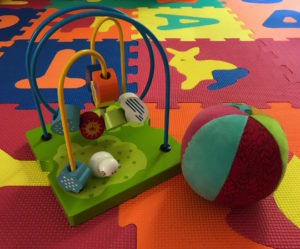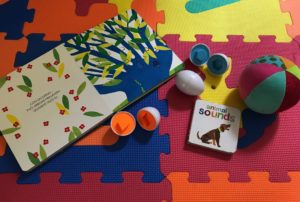Il gioco viene chiamato “il lavoro dei bambini”, perché giocando, i bambini imparano ad interagire con il loro ambiente, scoprire i loro interessi ed acquisire abilità motorie, socio-emotive e linguistiche.
Attraverso vari tipi di gioco i bambini imparano a scoprire, creare e risolvere problemi in un ambiente sicuro.
Mentre i bambini diventano più grandi, le loro capacità di gioco cambiano e diventano sempre più varie e complesse. È importante capire che esiste una variabilità nello sviluppo del gioco.
I genitori svolgono un ruolo fondamentale nell’aiutare la crescita delle abilità linguistiche che sono importanti per le esperienze di apprendimento successive.
Le attività di gioco sono indispensabili nella vita del vostro bambino. Concedersi del tempo per giocare con lui può aiutare a far nascere un rapporto ravvicinato e consente di fornire un modello per i valori importanti della vostra famiglia. Questa è anche un’opportunità per aiutare il bambino a sviluppare abilità linguistiche importanti in situazioni di divertimento.
Il livello di interesse di un individuo determina spesso quanto impegnato diventa in una determinata attività. Pertanto, è importante essere osservatori del gioco del vostro bambino ed impegnarlo in attività di gioco che per lui sono interessanti. L’aumento del coinvolgimento dei bambini offre maggiori opportunità per l’acquisizione delle lingue.
Modellare il linguaggio del vostro bambino consente di esporre nuovi vocaboli e la corretta costruzione grammaticale durante la conversazione. Il gioco è un’ottima occasione per dare un significato alle parole. Il genitore dovrebbe giocare e divertirsi con il bambino. Commentate quello che state facendo, aggiungendo una parola o una frase a quelle del vostro bambino. Date esempi di sinonimi a vostro figlio, modellate la struttura della frase in modo corretto.
Questo dipenderà dalla fase dello sviluppo linguistico del bambino, ad esempio:
Child: “Truck (camion)”… Parent: “Yes, a big truck”…
Child: “Truck, wheels (ruote)”… Parent: “The truck has 8 wheels”…
Child: “Truck fast”… Parent: “The truck goes fast”…
La ripetizione è fondamentale in tutte le aree di sviluppo. Ripetere la stessa attività può sembrare noiosa o inutile per gli adulti, ma serve a raffinare e stabilizzare le abilità per i bambini. Quindi, i bambini dovrebbero essere incoraggiati a ripetere le routine, le azioni e le parole, in particolare quelle che divertono. La ripetizione di parole o frasi aiuta a costruire un vocabolario. I bambini spesso amano leggere ripetutamente lo stesso libro. Attraverso la lettura ripetuta del libro, i bambini hanno l’opportunità di condividere la lettura, capire il vocabolario, sviluppare un senso della sequenza della storia ed iniziare a fare previsioni. I bambini imparano attraverso la ripetizione, ascoltando e cantando le stesse canzoni.
Spesso i bambini iniziano a cantare una volta che hanno ascoltato più volte la stessa canzone. Questa può essere usata anche per insegnare nuovi vocaboli e correggere la struttura delle frasi.
Dal momento in cui il vostro bambino è nato sta imparando a comunicare. Come primo insegnante, potete aiutarlo a sviluppare le abilità linguistiche attraverso la conversazione, il canto, il gioco e la lettura. Giochi ed attività che insegnano ai bambini come capire e utilizzare il linguaggio sono un modo semplice per costruire una connessione con il vostro bambino.
La comunicazione attraverso il gioco è la chiave per sviluppare una relazione amorosa. Parlare di cose che interessano il vostro bambino, raccontare delle filastrocche, giocare a “peek-a-boo” e altri giochi sono modi importanti per iniziare.
Parlate quando il bambino vi parla. Parlando a turno lo incoraggiate a parlare di più. Se non parla ancora, ascoltate i suoni che fa, riproducendo lo stesso suono.
Chiedete al vostro bambino di indicare le immagini. Quando chiedete al vostro bambino di indicare le immagini nei libri, lo aiutate a fare una connessione tra la parola e l’oggetto familiare, gli insegnate anche che i libri contengono informazioni che possono interessare.
Giocate insieme per insegnare parole nuove al vostro bambino. I neonati amano collegarsi ai genitori attraverso giochi semplici. Quando giocate “Where is your nose”, “I spy with my little eye” o cantate canzoni come “The wheels on the bus”, “London bridge’s falling down” in realtà insegnate al vostro figlio nuove parole e lo aiutate a parlare.
Ci sono molti modi per introdurre una nuova lingua al tuo bambino. Può sembrare difficile in un primo momento, ma ne vale la pena alla fine.
Importance of play
Play has been called “the work of children” because with play children learn how to interact in their environment, discover their interests, and acquire motor, speech, language, and social-emotional skills.
Through various types of play children learn to discover, create, and problem solve in a safe environment.
As children grow older their play skills also change and become more varied and complex. It is important to understand that there is variability in play development and these stages often overlap.
Parents play an important role in helping to facilitate growth of language skills that are important for later learning experiences.
Play activities are an important part of your child’s life. Giving yourself some time to play with your child can begin a close relationship and allow you to provide a model for the values that are important to your family. This is also an opportunity to help your child develop important language skills in fun situations.
An individual’s interest level often determines how engaged he becomes in a given activity. Therefore, it is important to become observers of your child’s play and engage them in play activities that they find interesting. Increased child engagement allows greater opportunities for language acquisition.
Modeling language for your child provides exposure to new vocabulary and correct grammar while speaking. Play is an excellent opportunity for a child to attach meaning to words. Providing accurate language input can include commenting about what you or your child are doing, adding a word or phrase to the child’s short phrases, exposing your child to synonyms, or by modeling the correct sentence structure. This will depend on the stage of language development of the child, for example:
Child: “Truck”… Parent: “Yes, a big truck”…
Child: “Truck, wheels”… Parent: “The truck has 8 wheels”…
Child: “Truck fast”… Parent: “The truck goes fast”…
Repetition is fundamental in all areas of development. Repeating the same activity may seem boring or useless to adults but it serves to refine and stabilize skills for children. Therefore, children should be encouraged to repeat routines, actions, and words, particularly those they enjoy. Repetition of words or phrases helps to build vocabulary. Children often like to read the same book repeatedly. Through repeated book reading, children have the opportunity to share in the reading, understand vocabulary, develop a sense of story sequence, and begin to make predictions. Children learn through repetition, listening to and singing the same songs repeatedly are encouraged.
Often, children begin to sing along once they have heard the same song several times. Therefore, repetition of songs can also be used to teach new vocabulary and correct sentence structure.
From the moment your baby is born they are learning how to communicate. They progress from crying, to speaking in phrases, and eventually to making short sentences. As your child’s first teacher, you can help your baby develop language skills through talking, singing, playing, and reading together. Games and activities that teach babies how to understand and use language are an easy way of building a connection with your child.
Communication through play is the key to developing a loving relationship. Talking about things that interest your baby, saying nursery rhymes, playing “peek-a-boo” and other games are important ways to begin.
Talk back when your baby talks to you. When you take turns talking with your baby, you encourage them to speak more. Even if they are not yet speaking words you can still take turns by listening to the sounds they make, making the same noise.
Ask your baby to point to the pictures. When you ask your baby to point to pictures in books, you help them make a connection between the word and a familiar object. You are also teaching them that books contain information of interest.
Play games to teach your baby words. Babies love to connect with parents through playing simple games. When you play “Where’s your nose?” or sing songs with finger plays like “The Wheels on the Bus,” “London bridge’s falling down” you actually teach your baby new words and help her practice speaking.
There are many ways of introducing a new language to your baby. It may seem difficult at first but it’s worth it in the end.



